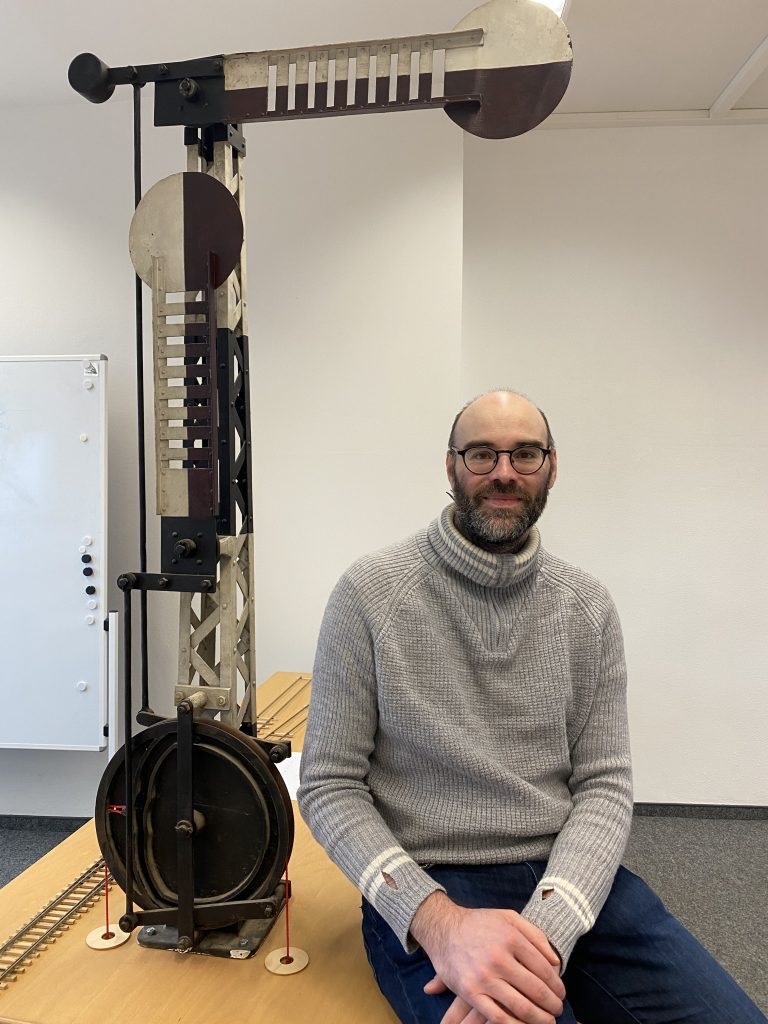Annoyance Train: Solutions from Research
Startseite » Annoyance Train: Solutions from Research
Annoyance Train: Solutions from Research
In the latest episode of the science podcast “Forsch!” Science in Conversation,

Train Chaos, Research and AI
“We all know that Deutsche Bahn is bad; that’s no secret. But what to do?” First of all, take a step back from the train-bashing and take a look at possible solutions! When asked about his assessment, the transport expert first lists the political, market economy and technical challenges facing Deutsche Bahn and assigns these to research fields. He reports that his research focuses on developing potential tools that initially serve to obtain reliable data. How punctual are travelers – not trains? Which objects, i.e. switches, rails, etc. – will require maintenance in the foreseeable future? What scenarios are conceivable through AI and, more broadly, digitization? “Can we use digital technology to implement other concepts so that we can allow more traffic?” These questions are the focus of research and should enable the railway to keep pace in international comparison.
Towards a Safe Timetable through Alternative Options
Resilience describes the ability to react to unforeseen events in a way that – in the case of the railway – makes it possible to guarantee daily operations without major restrictions. Current examples, such as the Weddeler Schleife or the freight train accident near Gifhorn, show how vulnerable Deutsche Bahn’s route network currently is. “We don’t yet know many good tools to design a rail network in such a way that we have a resilient network for various types of disruptions.” To do this, we need data for research first and foremost. According to Scheidt, what works are alternative routes.
More Journeys and Route Network Expansion: It’s not just about the Money
In addition to data-driven approaches in research, there is therefore a need for fundamental re-financing. Scheidt describes the rail network as obviously underfunded. He sees the reason for this in its “political status”. In view of climate change, Scheidt has no understanding for this. “Our focus is still on the road, i.e. on motorized private transport.” Per capita, 100 euros from the tax budget flow into the railway networks of Deutsche Bahn, relatively little compared to the frontrunner Switzerland: there, it is 260 euros per capita. Here, Scheidt draws a sober conclusion: “Germany doesn’t look particularly good there.”
In addition to missing data and low funding, skilled workers also play a role in a sustainable infrastructure. Students in the field of transport in particular are in demand on the job market. “All our graduates already have employment contracts before they have completed their master’s thesis.” At the same time, this means that these forces are lacking in research. Scheidt therefore takes a dim view of the entire topic of the transport transition and the lack of personnel resources.
The Five Basic Needs for Mobility
In the further course of the podcast, the guest and host talk about mobility and climate change. “Mobility enables us to fulfill our needs and have access to all of them. These are classically seen as the way to work, education, leisure, shopping and to [doctors].” Martin Scheidt criticizes that these five basic needs cannot be secured solely through road construction with a view to the climate, and yet the German state regularly creates incentives for this. According to experts, however, this very approach increases global warming. One solution would be to reduce individual transport while maintaining mobility. Transport is the sum of all transports. For example, we could have fewer cars on the roads, but still get the same number of people to their destinations by train. Scheidt sees the responsibility to counteract climate change “at all levels” – from politics to individual citizens.
Train Travel as a Means of Deceleration
Relaxed train travel – is that possible? The researcher answers the final question as follows: His last business trip took him to Barcelona and back, of course by train. Enough time and with the expectation of considering the journey itself as an experience, you can approach the matter much more relaxed. “Time is what most people worry about. For many, there is only one answer: as short as possible.” We should see the speed that flying can bring much more as a luxury good and not as a matter of course.
His recommendation for relaxed use in the existing timetable: Take the train from Braunschweig to Barcelona once, book far enough in advance to save on expensive costs and then enjoy the journey through the landscape.
The podcast “Forsch! – Science in Conversation” is a cooperation between the ForschungRegion Braunschweig and the Braunschweiger Zeitung. The moderators from ForschungRegion and Braunschweiger Zeitung talk to actors from the region about their research, their person – and about current social, political and ethical questions and debates. Now directly Listen to it here or stream it on Spotify, Apple Podcasts or Deezer.
